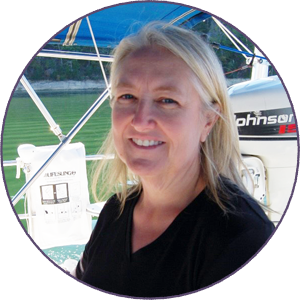Living on a sailboat while still practicing medicine didn’t seem like a realistic goal, but then Dr. Robin Mangione was introduced to locum tenens. It not only made practicing medicine while sailing a possibility, but it suited it perfectly.
To date, Dr. Mangione and her husband have sailed over 5,000 miles, primarily on the Eastern seaboard, but they soon hope to upgrade their boat and eventually travel the world.
“I was always afraid that medicine was going to keep us from doing this,” she says, “but quite the opposite: it has actually been the thing that has made it possible. It’s allowed us to travel and do and see things and meet people that I wouldn’t have the opportunity to do prior.”
The origins of a lifelong dream
Dr. Mangione and her husband began sailing in 1999, and what started as a “cool way to spend time together and travel,” evolved into a full-blown romance with the sailing life.
“My husband read Maiden Voyage by Tania Aebi who, between the ages of 19 – 21, completed a solo circumnavigation of the globe, and after reading it he fell in love with the idea of sailing. So we bought a sailboat and taught ourselves to sail,” she shares.
“So far we’ve been down to the [Florida] Keys, and up the Eastern seaboard,” she says.
They decided to test drive this living arrangement for a year, to see if it was financially or personally feasible.
“Locum tenens has allowed this dream to be a reality,” she shares. “It’s allowed us to do this while we’re young and healthy, since sailing is physically demanding.”
A somewhat unorthodox living arrangement
Living on a sailboat can be a test of anyone’s relationship, as you are always within 30 feet of your partner at all times, but Dr. Mangione says they enjoy each other’s company and wouldn’t have it any other way.
Additionally, Dr. Mangione’s husband, Michael, decided to quit his job and has chosen to be the one who stays back to take care of the boat while she’s on assignment. He’s found a love of sailing, and has become the boat’s “maintenance man and chief cook.”
“Because of the income and flexibility of locum tenens, Michael has been able to stay back to take care of the boat,” Dr. Mangione says. “He’s the one who keeps the systems on our boat running. We have a bit of a role reversal, because I’ll go to my assignment, and he’ll take the opportunity to explore.”
Sailing has provided them seemingly endless opportunities for exploration
Because of their mobility, they’ve been able to see parts of the world that just wouldn’t have been possible if they lived permanently in their home in Arkansas. The amount of locum tenens assignments has made seeing the different parts of the country a lot easier, and Dr. Mangione is able to pick and choose where and how long her assignment will be; she also uses this autonomy to decide how long between assignments she’d like to take off.
“One year I took an assignment during spring break, so those doctors with kids could have that time off,” she says. “I also like to work harder in the winter months and take advantage of the spring when it’s nicer weather when we can move the boat and sail more. I can choose to scale back on my workload, and I wasn’t able to do that at the hospital where I was working. Locum tenens has given me the freedom to do this.”

Enjoying their time while they’re “pre-tired” rather than “retired”
“Michael was working full time and I was working full time, and it came to a point where we had to decide whether we needed more time to spend with each other, or one of us was going to have to find another job,” she says. “Once we decided our priority was spending time with each other, we packed our stuff into a storage locker and bought our boat.”
They feel that assignments of three to four months is the perfect amount of time for exploration, but Dr. Mangione says she also likes to choose assignments of a week or weekend, since right now she’s decided not to work full time.
“We’ve stayed in the Keys for three months, we’ve stayed in Titusville, Florida, for a winter,” she says. “I took an assignment near Baltimore, in the Annapolis area for about four or five months, and we were in Maryland so that we could be near DC. So, we travel in between those places, but we’ll usually stay in a marina, pick an area we’re going to hang out for a while, and really explore.”
Dr. Mangione says that without the flexibility of locum tenens, she and her husband wouldn’t be able to fully appreciate the area and culture of each assignment’s location – or follow their dream of nautical living.
“We’ve really, really enjoyed what we’ve been doing, and I really feel like working locums has been very instrumental in the ability to follow our dreams.”



